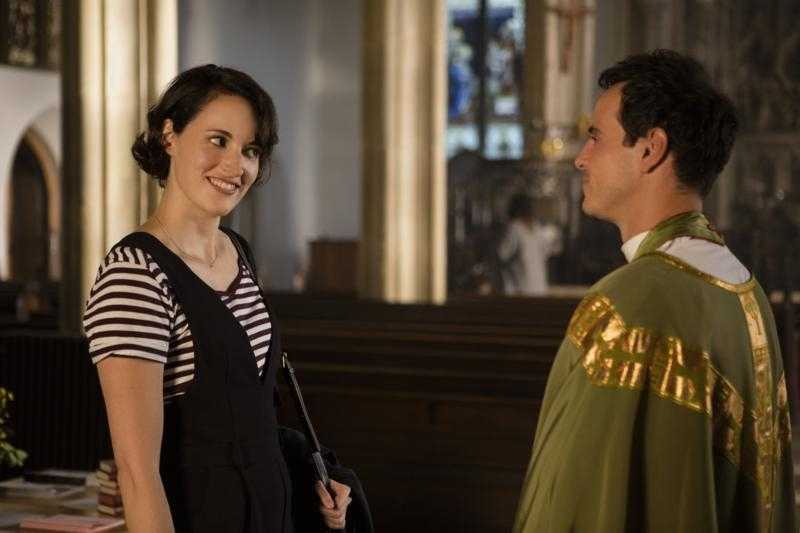Who is Fleabag? She still doesn’t have a name, but she is “just a girl with no friends and an empty heart … by your own description,” a therapist (Fiona Shaw) repeats back to her. Fleabag (Phoebe Waller-Bridge) glances briefly at the camera, her confidant, with a purposeful look. It’s one she gives many times over the course of the new season, which picks up just over a year since we last saw the character in her time, and three years since we’ve seen her in our own. Season 1 ended with a tear-streaked Fleabag on the outs with everyone and about to lose the cafe she owned with her friend Boo, whose sudden death haunts her deeply. Still, it ends on a hopeful note as the loan officer who rejected her initial proposal returns to give her a second chance. “Everyone makes mistakes,” he says simply. At the start of a more triumphant Season 2, Fleabag is not streaked with tears but blood, pouring from her nose. She looks slyly at the camera and declares provocatively: “This is a love story.”
While the first season of Fleabag was largely a meditation on grief via the slow reveal of a dark truth Fleabag was hoping to deny forever, Season 2 is much more open in every way. Everything’s coming up Fleabag at the moment — her cafe is thriving, she has given up self-destructive behaviors, and though she’s still not speaking with her sister (Sian Clifford) to start the season, it’s part of the healing that takes place over these six half-hour episodes.
Image via Amazon
The major thrust of the new season is Fleabag’s forbidden attraction to an extremely hot, nerdy charming, and grounded priest (Andrew Scott). It’s the source of many jokes, but in Fleabag’s world, jokes are usually just glibly-delivered truths. As she sits with the therapist for a session gifted to her by her father, the therapist repeatedly asks of her laughing replies, “is that a joke?” They never are, and yet, her jovial delivery makes them sound like they shouldn’t be true. That is part of the the brilliance of the show and Waller-Bridge’s writing. Fleabag distills the rawest human emotions down into the most economically precise dialogue, cutting directly to the quick, and all of it wrapped up in brightly glib packages. It’s universal and also incredibly female.
The characters in Fleabag are often sharp, intense, mean, and extremely passive aggresses, but a breathless pace and an extraordinarily charming cast balance it back to the side of quirk and whimsy. All is well, then, until you’re hit with an incredible pointed line of dialogue that gut-punches you. Again, the jokes are truth; in a conversation with the priest, he comments on their budding friendship and her staunch atheism, saying “you make me question my faith.” “And?” she inquires. “I’ve never felt closer to God!” he laughs. But it’s true; there is a fantastic back and forth where Fleabag takes a few steps towards an exploration of faith and the priest takes a few steps away from his. It is perhaps a metaphor for any relationship, where we leave our comfort zones to step into something new with someone else. In Fleabag though it is condensed, happening at an exceptionally rapid pace. But one of Waller-Bridge’s particular talents is making us care so deeply about every relationship on the show that we become incredibly invested in people we barely spend time with. Yet there is a calculation to the exactness of the dialogue, augmented by pitch-perfect performances, that makes Fleabag such a deeply-felt, honest series.
Image via AmazonImage via Amazon
It doesn’t hurt, either, that Fleabag and the priest have off-the-charts, exceptional, insane chemistry. Waller-Bridge and Scott have a natural rapport that also brings an immediate truth to their attraction and their ease in one another’s presence. If the first season of Fleabag was all about the character hiding herself and deflecting (though sex, conversations with the camera, and sarcasm), Season 2 is about her being seen in ways she allows and in ways that surprise her. The priest notices when she looks at the camera — not that she’s doing that specifically, but that she “goes somewhere” just for a moment. He understands her on a level no one else ever has, and eventually, she leans into that openness.
This second and most likely final season is one that revolves around restoration. Relationships are repaired, hard truths are faced, and things conclude with the same hope of a new beginning that will lead to something even greater. There is only one episode that really looks back into the past, where Fleabag hilariously looks too good for her mother’s funeral, and is complimented by everyone on how gorgeous and healthy she appears. “No matter what I do, my hair keeps falling down in this incredibly chic way!” she mourns. But it’s also an episode that ends on an ellipsis in the larger context of the season. Things aren’t wrapped up at the end for Fleabag, there’s still plenty that she needs to sort out for herself. That finale will, in many ways, serve as a Rorschach test for what viewers want to project onto Fleabag and her situation. But to quote her priest, “why believe in something awful when you could believe in something beautiful?”
Rating: ★★★★★
Fleabag premieres May 17th on Amazon Prime.

